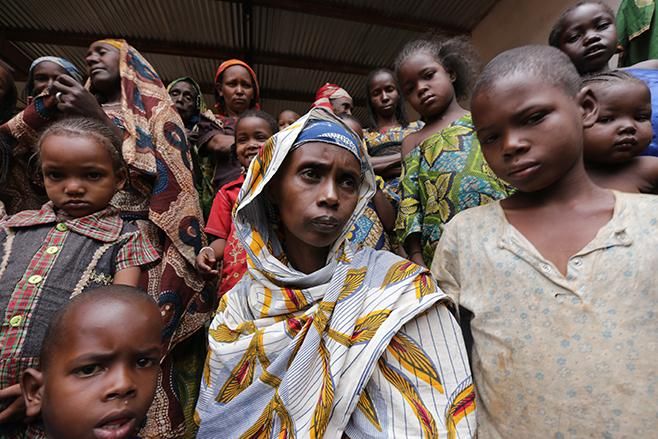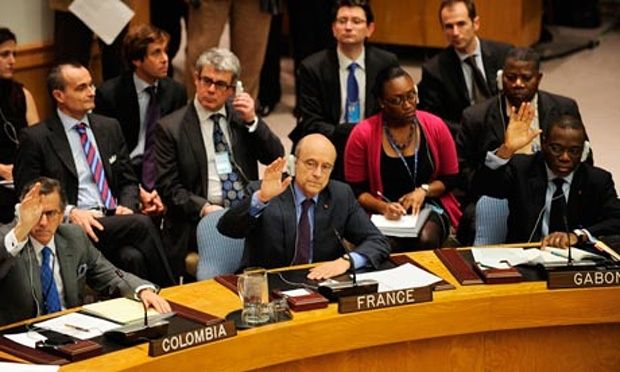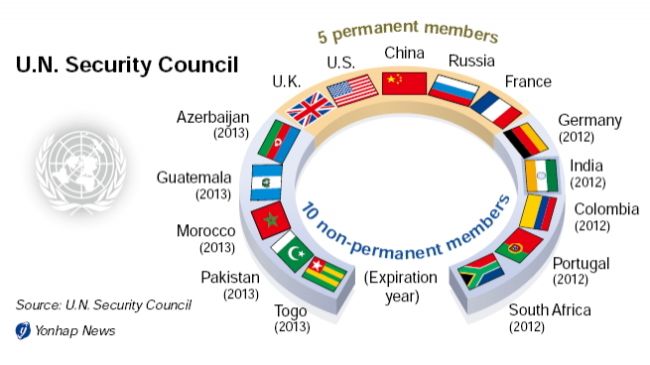Central African Republic - Muslim Communities Emptied
Muslim residents of the Central African Republic have fled the country in droves in the face of persistent attacks by anti-balaka militias, Human Rights Watch said today after visiting numerous towns and villages in the northwestern part of the country. The presence of French and African Union peacekeepers in these areas has been insufficient to protect Muslim residents, who are being targeted by the anti-balaka in retaliation for horrific abuses committed by the predominantly Muslim Seleka group over the past year.
The European Union and other concerned countries should immediately assist French and African Union forces trying to stabilize the country and halt the targeted anti-Muslim violence, Human Rights Watch said. The United Nations Security Council should urgently authorize a strong UN peacekeeping mission, as envisioned by the UN secretary-general, to protect civilians and provide the security necessary to rebuild the country, which has been devastated by massive human rights violations and a resulting humanitarian catastrophe.
“We are seeing entire Muslim communities that have lived in the Central African Republic for generations fleeing their homes,” said Peter Bouckaert, emergencies director at Human Rights Watch. “Muslims in the Central African Republic are contending with unendurable conditions and horrific violence, and the African and French forces there have not been able to protect these residents.”
Human Rights Watch today also released new satellite imagery documenting the vast destruction of homes by anti-balaka militia and, earlier, by the Seleka coalition, which took power in a coup in March 2013.
The anti-balaka militia comprise mostly Christian and animist residents who came together in September to avenge attacks on Christians by the Seleka. French and African Union troops, deployed in December to halt Seleka violence, found instead a situation where the anti-balaka were exerting greater control, forcing the Seleka to retreat and regroup, and making Muslim residents more vulnerable to looting and pillaging.
In the last week alone, Human Rights Watch observed some of the last Muslims of at least 10 locations in the northwestern region fleeing for Chad and Cameroon, just over Central African Republic’s northern and western borders, respectively. On March 1, 2014, a convoy of commercial trucks heading for Cameroon, protected by African peacekeepers, evacuated Muslims from Boali, Bossemptele, and Baoro.
In Boali, the convoy evacuated 650 Muslims who had lived under the protection of the Catholic Church for six weeks, leaving the town without any Muslim presence. In Baoro, the convoy evacuated the last 20 Muslims from the Catholic Church. That left the town, which once had a population of 4,000 Muslims and at least 12 mosques, without a single Muslim resident.
In Bossemptele, the convoy evacuated about 190 Muslims, but left behind about 65 weak and vulnerable women, children, and people with disabilities who were unable to climb onto the trucks. Human Rights Watch found nine Muslim children with polio and one elderly man suffering from leprosy among those left behind.
Halima, 25, a severely malnourished Muslim woman, told Human Rights Watch that the anti-balaka killed her husband and father-in-law in January, and that her three children disappeared in the chaos. She had tried to climb onto the departing trucks on March 1, but found herself too weak: “No one was there to help me,” she told Human Rights Watch in tears. “I was calling after them to take me, but they left without me.
“The depth of the suffering caused by anti-balaka violence is just unfathomable,” Bouckaert said. “In a misguided attempt to avenge the destruction of the Seleka, anti-balaka forces are committing horrific abuses against residents simply because they are Muslim.”
The Muslim community of Yaloké, which once exceeded 10,000 people, is now completely gone. The last Muslims there left for Chad a week ago. In many other towns and villages Human Rights Watch visited, including the large market towns of Zawa, Bekadili, and Boganangone, and the smaller town of Boguera, not a single Muslim remains.
On February 28, anti-balaka fighters killed the last Muslim in Mbaiki, which, as one of the largest population centers in the country, had a pre-conflict population of at least 4,000 Muslims. The anti-balaka also burned the city’s two main mosques. They caught Saleh Dio, who had refused to leave the town and was trying to reach the safety of the police station, and cut his throat.
On February 12, the French defense minister, Jean-Yves Le Drian, and the Central African Republic’s interim president, Catherine Samba-Panza, had visited Mbaiki and declared it a “symbol” of peaceful coexistence and reconciliation.
Even in communities where Muslims remain, they face extreme violence from the anti-balaka. In Boda, a diamond trading center, an estimated 3,000 to 4,000 Muslims remain, but they are unable to leave the Muslim district of the town, despite the presence of French forces. Anti-balaka fighters have prohibited anyone from selling food to the Muslims, and on February 28, Human Rights Watch found that many of the Muslims in Boda were starving. The French are deployed between the Muslim and Christian communities, keeping them apart, but have been unable to end the food blockade, Human Rights Watch said.
Al-Haj Abdou Kadil, a frail Muslim man, told Human Rights Watch that he had buried two of his children, Mousa, 3, and Mohammed, 4, who died from hunger the day before. His wife was so weak from hunger that she was unable to speak.
In Bohong, a large cattle-raising town with many people from the Peuhl ethnic group, Human Rights Watch found 120 Muslims remaining in the mosque. They said that the anti-balaka had executed two ethnic Peuhl cattle raisers who had gone to look for their cows just 10 days before. When Human Rights Watch confronted the anti-balaka commanders about the execution, the commanders appeared to admit responsibility for the killing, saying, “They asked to go look for their cows, and we said, ‘Sure,’ and well, they didn’t come back.” The commanders then started to laugh.
Satellite image illustrating extensive building destruction in a Christian neighborhood of Bohong. Destroyed buildings have been graphically-highlighted in red. Damages occurred before 7 November 2013. Date of image: November 7, 2013. © CNES 2014; Source: Astrium.
Satellite imagery
Human Rights Watch acquired and analyzed satellite imagery that documents the scale of the destruction in more than 60 affected towns and villages in northwestern Central African Republic, including over the last several months, when more peacekeepers were deployed.
In Bossangoa, for example, satellite imagery shows the rapid displacement of thousands of local residents in early December 2013, as well as the systematic destruction of over 1,400 mostly residential buildings. Human Rights Watch observed and gathered accounts from witnesses to corroborate the exodus of virtually the entire Muslim community of Bossangoa, between 7,000 and 10,000 people. The residents sought protection at a nearby school, École Liberté, after anti-balaka attacks on December 5. A campaign of arson attacks on mostly residential buildings between mid-December and late January 2014 almost completely destroyed the Muslim neighborhood of Boro, in the northern half of town.
In Bohong, witnesses had told Human Rights Watch that Seleka forces attacked the town in late September 2013, deliberately targeting Christian neighborhoods, and leaving only the Muslim quarter in the southern part of the town relatively unscathed. Satellite imagery confirmed these findings and showed that more than 1,130 buildings – most of them residential – had probably been burned to the ground by early November.
When Human Rights Watch representatives met with the anti-balaka commanders in Bohong last week and asked if they would be willing to allow the remaining Muslims to stay there, the commander responded: “We have lost all of our homes because of the Seleka. They threw bodies down all of our water holes. And the Muslims are still living in their homes because they were with the Seleka – and now you ask us to tolerate their presence?” The commander asked for immediate humanitarian assistance to help the non-Muslim villagers rebuild their homes and lives.
Human Rights Watch found almost the same situation in Boda, where 892 non-Muslim homes were burned during inter-communal violence in early February. The anti-balaka commander there also told Human Rights Watch that he could not accept Muslims staying in their intact houses in Boda while non-Muslims were forced to sleep outside because the Seleka had destroyed their shelters.
“The humanitarian needs in the Central African Republic are dire, and if they are not addressed, they will contribute to further conflict,” Bouckaert said. “Donors should provide reconstruction assistance to those who have lost their homes, which could lessen the inter-communal tensions fueling the violence.”




![Security Council resolution 1244 (1999) [on the deployment of international civil and security presences in Kosovo]](https://img.karabakhtoday.com/news/2016/01/photo_466.jpg)